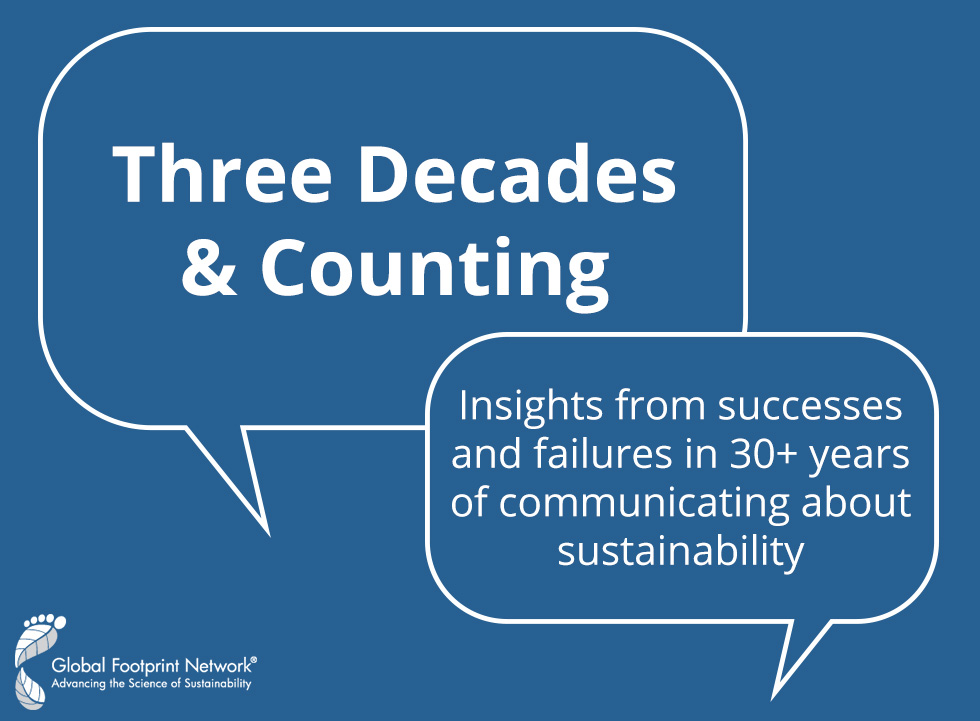Learning from our Successes and Failures – and from YOU!
by Mathis Wackernagel, Co-Founder and President
There is ever more indication that the current narratives around sustainability, climate, and resource use have not succeeded in winning people’s hearts and minds. At least not to the extent necessary to make the needed transformation a priority, and not amongst the broader public nor the policy elite.
The common narratives have not brought audiences closer to the topic. They have not built the emotional attraction. Nor have they strengthened the audiences’ ownership over the necessary sustainability transformation. As a result, the current narrative is stuck in “a noble cause” conversation, which many people associate with burden, suffering, and sacrifice. It is a narrative that is self-defeating.
The reason the sustainability transformation is seen as noble is amplified by a widespread but misguided belief: that those who act for sustainability bear the cost while the benefits are spread to a distant humanity. This misaligned incentive is termed “tragedy of the commons”, a dynamic that leads to a destructive tension between individual and collective interests.
From this “tragedy of the commons” perspective, climate or sustainability action is noble and may be existential for humanity, but not necessary for oneself. The belief that climate action is merely a noble gift to humanity instills little confidence that this will be enough to turn the trends. People feel powerless. They see a big humanity on a big planet that needs to be rescued, but their individual contribution seems as insignificant as a single drop in the ocean.
The benefits of action
However, at Global Footprint Network, we believe the overemphasized “tragedy of the commons” narrative is unhelpful. Those who act to advance sustainability often reap unrealized and accruing benefits that make it worthwhile for them to continue their sustainability efforts. For example, once we realize that the future will have to become far more resource efficient and inevitably fossil fuel free, it becomes a clear value proposition to invest in our own cities by:
- Investing in efficient heating and cooling systems for residents,
- Implementing fossil-fuel free transportation systems (with extra emphasis on people-powered options like walking and biking), and
- Creating livable neighborhoods that make local living practical and pleasant, etc.
These investments all increase the resilience of the city, preserve the city’s wealth, and, as a by-product, also reduce pressure on the biosphere.
The most dangerous approach for any sustainability actor is inaction and delay because it puts themselves directly at risk. The reason is simple: if you are not preparing for the predictable future, you and your assets will not be ready for that condition. To not prepare and adjust is economic self-sabotage.
Exploring our communications
In order to encourage a shift in the narrative where sustainability and climate action is seen as necessary for oneself, I have found it invaluable to approach communications with three key tenets in mind:
- Help our clients, partners, and audiences see that they are not powerlessly trapped by the “tragedy of the commons.”
- Always use a narrative where the sustainability actors demonstrate they are “in the game” and will benefit from their actions.
- Choose a narrative that makes the topic desirable.
We want people to fall in love with becoming one-planet compatible. We want people to recognize that acting for climate and sustainability is a ticket to their own success. It should be so inviting that many people take the transformation on as their passion. This approach aligns with Global Footprint Network’s perspective.
Therefore, we experiment with:
- How do we help anyone recognize their direct “skin in the game”?
- How do we make obvious that people’s own success stems from, and in fact depends on, contributing to sustainability?
- Is our “skin in the game” narrative based in reality, or merely wishful thinking? If it’s not solid enough, how can it be developed and expanded? If it is, how can it be deployed?
- We have tried many paths in the past. Which of our efforts failed and which helped us pivot?
- What can we learn from others about engaging effectively with partners and audiences?
These are questions we will pursue in our upcoming monthly blog series Three Decades & Counting: Insights from successes and failures in 30+ years of communicating about sustainability. Please share your ideas and perspectives with us by completing the form below! We’d like to incorporate your thoughts into future blog posts, and we always love to hear your reactions and reflections.
Creation of this content generously funded by the MAVA Foundation for Nature 



